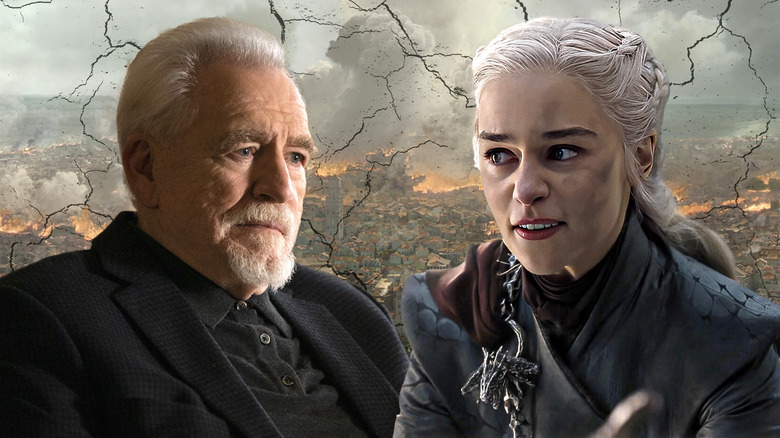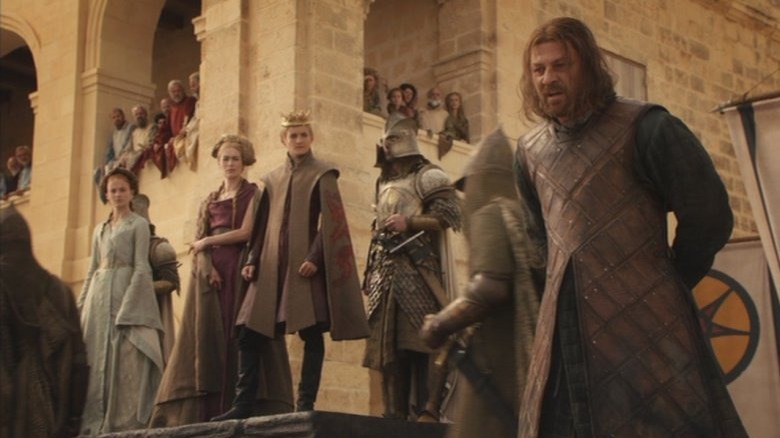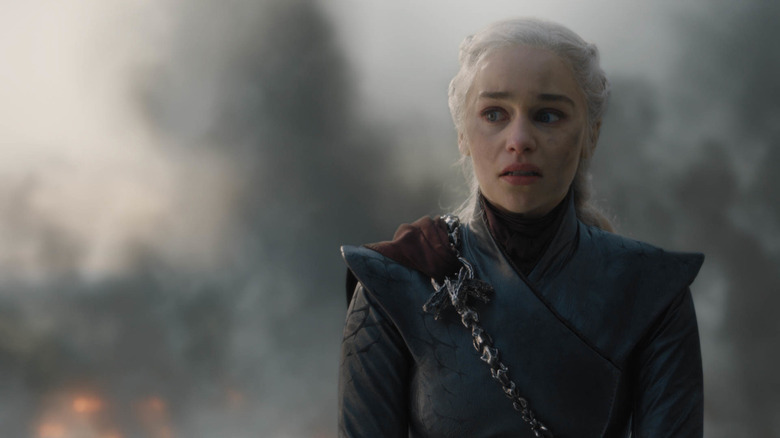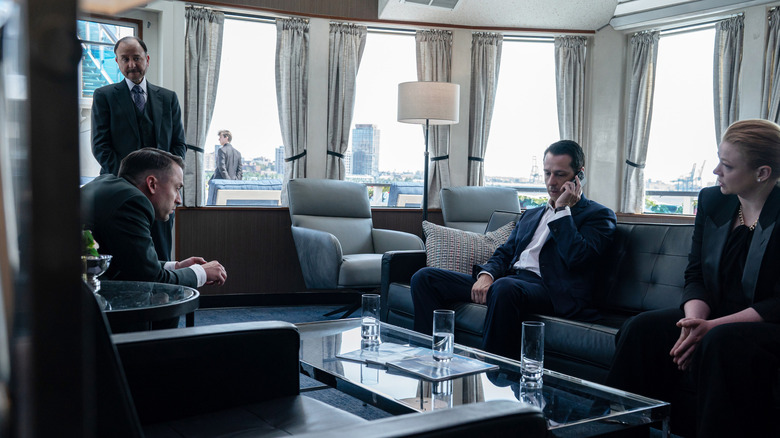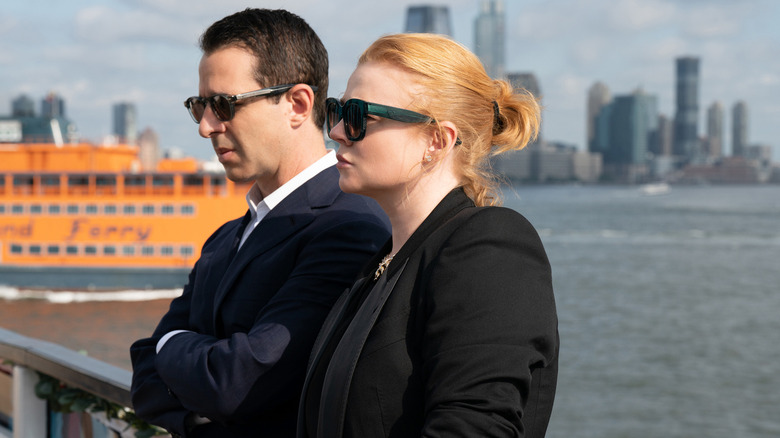Succession Succeeded On The Big Twist Approach Where Game Of Thrones Absolutely Failed
Pulling off a big twist on a beloved tentpole show — especially one on a network accustomed to taking home truckloads of Emmys each year — is tricky. Just ask Dan Benioff and D.B. Weiss.
The showrunners of "Game of Thrones," who led the adaptation of George R.R. Martin's series "A Song of Ice and Fire" from beginning to end, were always divisive figures amongst the show's fandom, especially when they ran out of books to adapt. In retrospect, the fact that the two blew $10 million on a failed pilot that had to be entirely re-shot was probably a decent indicator of things to come, but hindsight is 20/20. Benioff and Weiss wanted "Game of Thrones" to be over earlier than HBO (and Martin) thought felt right, partly because they really wanted to go make their "Star Wars" project that eventually got canceled. As a result, the seventh and eighth seasons of the show ended up causing so much controversy that the cultural cache of the entire show — a show that was all anybody talked about for roughly 10 years — faded overnight.
Everyone knows the basics of what went wrong with "Game of Thrones." The pacing became lightning-fast, the time-space continuum ceased to matter, and character motivations stopped making a lick of sense. Perhaps the biggest issue, though, was the big twist right at the end. Here's why it failed, and why its fellow HBO hit "Succession" pulled off the hat trick "Game of Thrones" so badly wanted to accomplish.
Both Succession and Game of Thrones love a good twist
"Game of Thrones" was always a series built on subverting audience expectations. From the very beginning of both the book and series, you think Ned Stark, played onscreen by Sean Bean, is the show's protagonist ... until he gets his head chopped off by a murderous, lunatic child king. Between Ned's beheading and events like The Red Wedding, "Game of Thrones" thrived in moments like Oberyn Martell (Pedro Pascal) dancing victoriously around his opponent on the battlefield only to have his eyes gouged out moments later, or Tyrion Lannister (Peter Dinklage) shot his dad midway through doing a number two on the toilet.
"Succession" is the, uh ... successor to "Game of Thrones," in many ways, as the next show where a bunch of mean, clever people fight for the ultimate seat of power. And sure enough, "Succession" likes a twist as much as its fantasy-based predecessor. The series opens with patriarch Logan Roy (Brian Cox) having a health problem, setting up a "King Lear" style narrative for everything that comes after — and boy, are there some wild twists. Logan gets wind of his kids' plan to usurp him and screws them out of the family media company first. In the episode before that, Roman Roy (Kieran Culkin) sends a d*ck pic to his dad instead of the older female executive he was trying to harass. Those examples are just from Season 3. "Succession" revels in a plot twist just like "Game of Thrones," but it also does a better job.
Game of Thrones' rushed twist completely failed both its fans and its characters
It seemed somewhat inevitable that, as "Game of Thrones" drew to a close, we would see the mental downfall of Daenerys Targaryen (Emilia Clarke), the "mother of dragons" and seemingly righteous crusader for freedom and goodness. The issues with Daenerys were always there, and they were two-fold. For starters, it is often noted in the series that she has a family history of mental instability — as the show's saying goes, "every time a Targaryen is born, the gods flip a coin." Add in the fact that she has three unstoppable weapons in the form of giant fire-breathing dragons, and it's easy to see she is destined to become the show's bad guy when all is said and done.
The reason "Game of Thrones" failed its audience and Daenerys herself with the controversial "Mad Queen" twist has nothing to do with the content, but the execution. After getting dumped by her lover (who's actually her nephew) and watching her closest confidante lose her head, Daenerys just ... well, she gets mad and commits genocide. That's it. The show tries to tell us, after the fact and through Tyrion, that Daenerys was always bad, but "Game of Thrones" desperately wanted to have it both ways. It wanted to subvert expectations like it once did with Ned's head and have Dany lose her mind and become evil, but it also wanted us to cheer for her right up until that point. Hell, they had parents out here naming their daughters Daenerys and Khaleesi.
Succession's twist, on the other hand, subverts expectations carefully and thoughtfully
Unlike Daenerys Targaryen, we were never supposed to like Logan Roy. Logan was a cruel father who was capable, in moments of fury, of physically attacking his own children. He was a terrifying media mogul who wanted his enemies to bleed to death in front of him. Even without three dragons, he was a frightening warrior ... until he wasn't, and until he died an unremarkable, abrupt, and mundane death off-screen.
In the third episode of the final season of "Succession," Logan collapses and dies on his private plane, flying to Sweden to try and complete a major deal. He's not with his family or anyone who truly loves him, but is surrounded by subordinates. His children Kendall (Jeremy Strong), Shiv (Sarah Snook), and Roman (Kieran Culkin) are at the wedding of his eldest son Connor (Alan Ruck), and even though those first three frantically yell into a speakerphone that they love him and that he can't die, there's no way of knowing if he hears them while he undergoes ultimately futile chest compressions. This is the biggest twist "Succession" has introduced — killing the series' largest character so early into its final run — and it's also so incredibly ordinary. Logan doesn't go out in a blaze of glory. He just dies. It's also more shocking, more moving, and more gripping than pretty much anything that happened at the end of "Game of Thrones."
Here's why Succession succeeded and Game of Thrones didn't
It's pretty simple: "Game of Thrones" didn't make its twist work because it tried too hard, forced it to happen too fast, and in doing so, ended up with a totally sloppy plotline that made sense on paper and not in practice. "Succession" made a huge twist work because it was so precise: writer Jesse Armstrong and director Mark Mylod created a tense, basically perfect hour that will go down in television history, because they were careful and meticulous.
The really amazing thing about these two twists is this: they were both things that were bound to happen. Logan always had to die: "Succession" is, after all, the title of the show. Daenerys was probably always going to go mad, but there was a way for that to happen that involved some finesse. That didn't happen, clearly. "Game of Thrones" desperately wanted to pull off a game-changing twist as its narrative drew to a close, but it would be bested just a few years later by "Succession," which pulled off the tightrope walk that it never could. Dramas can learn from "Succession" and its quiet, performance-driven, emotionally resonant twist we could all see coming from a mile away, and dramas can also learn what not to do from "Game of Thrones."
